Eritrea: The Challenges Of Today And The Prospects Of Tomorrow
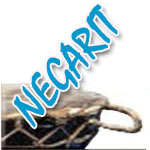
(This is the source of the speeches which I delivered in Melbourne on the 29th of December 2012 and in Perth on January 21, 2013. I will present a comprehensive report about my busy schedule in Australia, hopefully soon. I have now returned home after my hosts in Australia fattened me like a cow to the extent that I will eat one-meal a day for a few weeks. My tour was sponsored by EAJP- Eritrean Australians For Justice And Peace.)
I am indebted to the Eritrean Australian community for their continuous support, and I thank you on behalf of myself and my colleagues at awate.com.
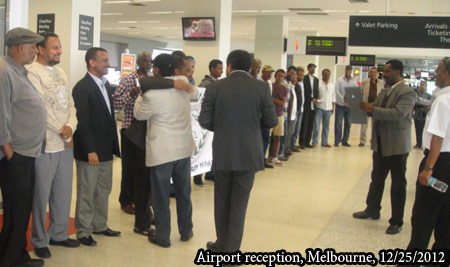 I thank you for giving me this opportunity to speak in front of you, in front of a patriotic gathering that represents a microcosm of Eritrea. I thank the administrators and members of EAJP (Eritrean-Australians For Justice And Peace) for making this event happen, and for providing me with an opportunity to visit Australia, which I always wanted to visit but never managed to do so for many reasons. Thank you for providing me with an opportunity to connect with my childhood friends, family, relatives and many patriots I came to know over the years.
I thank you for giving me this opportunity to speak in front of you, in front of a patriotic gathering that represents a microcosm of Eritrea. I thank the administrators and members of EAJP (Eritrean-Australians For Justice And Peace) for making this event happen, and for providing me with an opportunity to visit Australia, which I always wanted to visit but never managed to do so for many reasons. Thank you for providing me with an opportunity to connect with my childhood friends, family, relatives and many patriots I came to know over the years.
Since September of this year, Eritrean patriots have been facing serious provocations; certain forces wanted to see if after all, Eritrean patriots have anything they hold dear. The test was an alarm that shook the patriots and they showed what kind of mettle they were made of. The September incident was deliberately triggered as a challenge, the onslaught on the person of our hero Hamid Idris Awate has only hardened our resolve and once more it alerted us to the fact that what is at stake is bigger than any of us could have imagined. The onslaught has changed the way we see things, and the Eritrean resistance has changed for good: it is now defined as pre and post-September 2012: the timid pre-September opposition and the post-September resistance. And that means, we have to change the way we conduct our resistance.
With that as a background, my speech will be on the theme chosen by EAJP, “Eritrea of Today; Eritrea of Tomorrow” but I will stretch it a little back and add a focused review of the past that brought us to where we are. I will begin with the Eritrea of Yesterday, the foundational Eritrea, the one handed down to us by our founding fathers, the one for which we all bled and suffered, the one that we hold dearly in our hearts. I will begin with the Eritrea of yesterday, (its history) because without that, there wouldn’t be an Eritrea to worry about. Also, since our country suffers Today, and we wish to have a better Tomorrow for our people, it is relevant that we talk about our history.
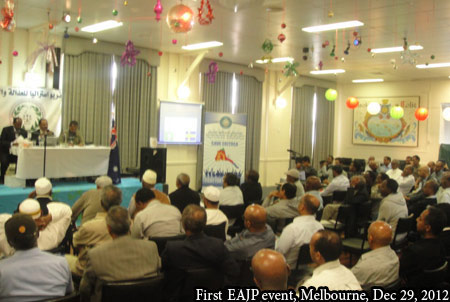 If you see and recognize a seed of a plant, you would know what kind of tree it will become and the fruit it will bear. Cicero, the great Roman master rhetorician, said, “To remain ignorant of things that happened before you were born is to remain a child.” We refuse to remain children. We refuse to watch silently while a few are sullying our history. We refuse to let them strip us of who we are. We refuse to be indifferent to the wicked, to the cursed,… and “cursed” is not only my word for the Christian bible has defined them as such in Deuteronomy 27:17, “Cursed be he who removes his neighbor’s landmark.” And that is the reason why we are not fixated by history for its own sake, but for what results from tampering with and forging history.
If you see and recognize a seed of a plant, you would know what kind of tree it will become and the fruit it will bear. Cicero, the great Roman master rhetorician, said, “To remain ignorant of things that happened before you were born is to remain a child.” We refuse to remain children. We refuse to watch silently while a few are sullying our history. We refuse to let them strip us of who we are. We refuse to be indifferent to the wicked, to the cursed,… and “cursed” is not only my word for the Christian bible has defined them as such in Deuteronomy 27:17, “Cursed be he who removes his neighbor’s landmark.” And that is the reason why we are not fixated by history for its own sake, but for what results from tampering with and forging history.
In 1963, Penn Station, a landmark of New York City was demolished to make room for office buildings and what we now know as Madison Square Garden. The demolishing of the original building of Penn Station caused a public uproar that still continues. New Yorkers considered it a landmark building that should be preserved, but the commercial interests won. At the time, The New York Times editorial lamented over the destruction of Penn Station: “We will probably be judged not by the monuments we build but by those we have destroyed.” In ten-years, objection to such irresponsible treatment of landmarks resulted in the Grand Central Station being protected by a statute, the Landmarks Preservation Act.
We have one major statue of Awate in our memories, a statue of a lone brave man raising a gun to face Haile Sellassie’s mighty army that is imprinted in our minds. Now, the habitual aggressors are after the memory of Awate that we hold dearly. Even that is not spared–what then remains of our roots, our history, our pride and our inspiration? It is our right and obligation to safeguard our memory, even if we have to go to passing an act that would prevent the few symbols that are left for us. Unjust persons do not like history, but they love rewriting it. The Eritrean government is a good example and it is good in erasing our history and in rewriting it. I believe that all our current ills are caused by the reckless Eritrean regime; its disregard for our history as a nation is beyond comprehension. That is why I like to emphasize on what history means to me. And in the words of George Santayana “a country without a memory is a country of madmen.”
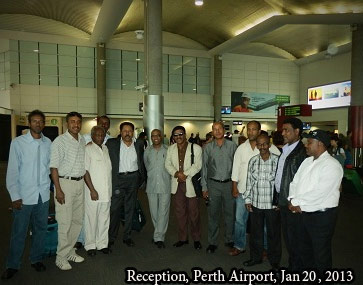 Eritrea was not a racial state, it was not of one section of its people; it was a country where diverse people reside. Eritrea was formed on an idea: freedom, equality, and dignity of its residents. That idea of Eritrea was erected on several pillars; the entire Eritrean people agreed on the type and form of those pillars. That agreement was our social contract, free Eritreans elected their representatives who signed that covenant, and political forces of the time blessed it. Thus, we laid what we call foundational pillars of the nation, Thewabit Wetenya in Arabic, or Hagerawi Amde-meseret in Tigrnya. And in the words of George Santayana, “Those who cannot remember the past are condemned to repeat it“
Eritrea was not a racial state, it was not of one section of its people; it was a country where diverse people reside. Eritrea was formed on an idea: freedom, equality, and dignity of its residents. That idea of Eritrea was erected on several pillars; the entire Eritrean people agreed on the type and form of those pillars. That agreement was our social contract, free Eritreans elected their representatives who signed that covenant, and political forces of the time blessed it. Thus, we laid what we call foundational pillars of the nation, Thewabit Wetenya in Arabic, or Hagerawi Amde-meseret in Tigrnya. And in the words of George Santayana, “Those who cannot remember the past are condemned to repeat it“
The traditional Eritrean abodes, the tukul and hdmo, stand on pillars that carry the weight of the roof and support the walls. If any of the pillars is broken, the tukul as well as the hdmo will crumble. The Eritrean regime of the PFDJ clique is relentlessly shaking the pillars of Eritrea, and if the pillars are broken or damaged any further, Eritrea will crumble. And that is why we need to protect the pillars that hold Eritrea together. And the shaking and damaging of the pillars that is going on today under the command of the Eritrean regime, and other chauvinistic and bigoted revisionists, those who use effigies as frontmen, are the eminent danger. Ensuring the safety and wellbeing of the Eritrea of tomorrow requires fighting the vandals who are defacing and stopping them from damaging our country. If those pillars were properly maintained, preserved and protected, we wouldn’t have the suffering of today. And there you have it: the connection of the yesterday, the today and the tomorrow of Eritrea depending on the wellbeing of the pillars.
We all carry identities, layers upon layers of them, and we are not ashamed of our identities, they are our pride. Our identities are not slurs akin to four-letter words. Our identities are us; without them we are nothing.
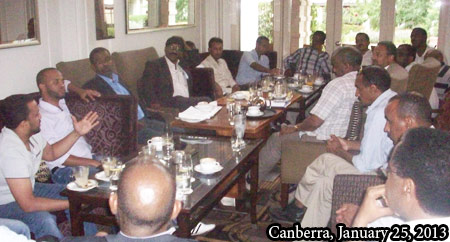 Eritrea doesn’t belong to anyone alone, it belongs to all those who carry its citizenship, those who believe it is their country and are connected to it, Eritreanism is based on a belonging, on a citizenship which is not bestowed based on the whims of a clique that hijacked the fate of our patient and enduring people. Eritrea belongs to all its tribes, clans and sub-clans, the enda, the beit fulan and bet fulan. It belongs to all religions, it belongs to all regions. We are Hamasen, we are Barka, we are Sahil, we are Denkelis, we are Akeleguzai and the rest. We are Mulsims, we are Christians and anything between. We are Beni Amer, we are Serawetot, we are Hamasenetot, we are Senhitays, we are Kunamas, Baryas, we’re Almeda, Asfeda, Mensa’e, Jeberti, and everything else. We are Kebessa and Metahit. We areAfer, we are Barya and Baza. We speak Saho, we speak Bilen we speak Bdawyet, we speak Tigrayet, we speak Tigrniya and yes, we speak Arabic. That is our diversity that we adore and pledge to protect and maintain; we refuse to be diluted into a uni-cultural nation through proclamations issued by Isaias or someone like him. These multi-layered identities are our diversity–it has always been with us and it will remain so. But those who see Eritrea as their private property are obsessed with remolding it according to their whims, and they are the cause of our present suffering and anxiety. That is the challenge that we are facing today; and they require fierce and resolute resistance, not wishy-washy attitudes and approaches.
Eritrea doesn’t belong to anyone alone, it belongs to all those who carry its citizenship, those who believe it is their country and are connected to it, Eritreanism is based on a belonging, on a citizenship which is not bestowed based on the whims of a clique that hijacked the fate of our patient and enduring people. Eritrea belongs to all its tribes, clans and sub-clans, the enda, the beit fulan and bet fulan. It belongs to all religions, it belongs to all regions. We are Hamasen, we are Barka, we are Sahil, we are Denkelis, we are Akeleguzai and the rest. We are Mulsims, we are Christians and anything between. We are Beni Amer, we are Serawetot, we are Hamasenetot, we are Senhitays, we are Kunamas, Baryas, we’re Almeda, Asfeda, Mensa’e, Jeberti, and everything else. We are Kebessa and Metahit. We areAfer, we are Barya and Baza. We speak Saho, we speak Bilen we speak Bdawyet, we speak Tigrayet, we speak Tigrniya and yes, we speak Arabic. That is our diversity that we adore and pledge to protect and maintain; we refuse to be diluted into a uni-cultural nation through proclamations issued by Isaias or someone like him. These multi-layered identities are our diversity–it has always been with us and it will remain so. But those who see Eritrea as their private property are obsessed with remolding it according to their whims, and they are the cause of our present suffering and anxiety. That is the challenge that we are facing today; and they require fierce and resolute resistance, not wishy-washy attitudes and approaches.
But all of that is not meant to decrease Eritrea into its constituent parts, fragment and disintegrate it, it is not meant to be understood as identifying the Eritrean peoples in the plural. Nay, there is one nation called Eritrea and it is the home of the Eritrean people (in the singular) and not Eritrean peoples, or Hzbtat Ertra or Sh’oub Eritrea, (in the plural), it is Hzbi Ertra and Sha’ab Eritrea.
The challenges of today forces us to pose a question: How would Awate face today’s PFDJ had he been alive and able bodied? How would he assess our present disunity and compartmentalization? Would he be content with what has happened to his people?
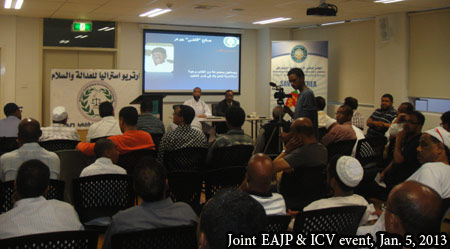 It is to find inspired answers for such questions that we need to protect our icons so that we can be emboldened and be better citizens, brave and responsible citizens. Awate is not with us, but we have to be careful not to betray his ideals and not disappoint him down as if he was alive, still carrying his rusty rifle. In every situation, it would help to ask: what would Awate do if he faced that situation. And we will find the right answer. We wouldn’t indulge in greed, selfishness, cowardice; instead we would be inspired to be brave, to think along national lines, think about the entire Eritrea and consider one of his erstwhile pronouncements: Eritrea will not find a solution unless all its children strive to find one together.
It is to find inspired answers for such questions that we need to protect our icons so that we can be emboldened and be better citizens, brave and responsible citizens. Awate is not with us, but we have to be careful not to betray his ideals and not disappoint him down as if he was alive, still carrying his rusty rifle. In every situation, it would help to ask: what would Awate do if he faced that situation. And we will find the right answer. We wouldn’t indulge in greed, selfishness, cowardice; instead we would be inspired to be brave, to think along national lines, think about the entire Eritrea and consider one of his erstwhile pronouncements: Eritrea will not find a solution unless all its children strive to find one together.
Today we see youth movements, basically Internet social media movements, that are wailing endlessly for every calamity that our country and people face. Yet, most of the youth, either because of ignorance or because they carry some social prejudice, are the first to belittle their history and the veterans of the struggle era. I will not say much here but only repeat what my friend Saleh Younis wrote on this aspect:
I am not romanticizing just Ghedli: I am romanticizing the Ghedli generation (in much the same way that [American journalist] Tom Brokaw wrote about America’s “greatest generation”–the World War II generation.) I am 100% convinced that if what is happening in Sinai to Eritreans–inhumane, cruel, degrading, offensive–happened while the Ghedli generation was in their 20s, they wouldn’t have been writing petitions and saying, “Wey Gud! Eh! Anta Amlak!” The Ghedli generation existed before the New Age values: they were an assertive, kick-ass generation and somebody would have paid. What came after them, and what came before them, didn’t measure up to them.
Often times we are disappointed by the actions of the revisionists among us, they are a bunch of sadists who get pleasure when Eritreans hurt. These are people who believe they have a divine mandate to rule the rest of us or at least decide on our behalf. Yet, they talk about unity, though their envisioned unity is as seamless as the unity of a slave and his owner. They preach justice, but it is always tilted. They forget that people struggle and pay with their lives to better their lots. If citizens suffer from a national regime just like they do from a foreign occupier, then they have to fight back with the same zeal. Oppressor may change but oppression remains the same, and it has to be fiercely confronted and fought, it is all the same and any oppression should face the same resistance. Changing the statuesque requires sacrifices, and after all, life under oppression is not worth living, and sacrifice for the betterment of the people becomes more glorious,.
Anyone has a name and our country has one, it is Eritrea that has marine and land boundaries. Though it has been aggressively assaulted, it also has a flag, an emblem, a constitution, regions, tribes, religions and many other attributes.
As I said earlier, the assault on Awate was not the beginning. There is a saying in English, “give them an inch, they take a mile.” We watched silently as the regime scrapped our flag and imposed another on our country. We watched silently as it parceled Eritrea among its beneficiaries, each region being lorded by a corrupt general. We watched silently as the regime instituted a uni-cultural state. We watched silently as it imposed agrarian values at the expense of pastoral life style. We watched silently as it disowned our refugees who have been languishing in the refugee camps in Sudan for decades. We watched silently as it snatched the citizens’ properties, land of the refugees and distributed it among its functionaries and beneficiaries. Eritreans watched silently as Isaias promoted himself to a Pharaoh. We watched silently as he molded Eritrea in his image. As you know, the assault on the flag started in 1977, and today we see the result. Even those who were supposed to resist the rule and symbolism of the Eritrean regime were shy to show the true Eritrean flag–they threw it away for Isaias’ avatar. How come Isaias’ flag has now overwhelmed some forces that declare their opposition to his regime? Have you seen that ugly flag carried by any opposition prior to 2000? Nope. It pains me to see the Eritrean opposition carrying different flags as if Eritrea doesn’t have one. Only a few organizations carry the real Eritrean flag (shyly) as if it is the flag of a pirate force. Did you notice the meetings of some of the so-called opposition who are so eager to be accepted by the PFDJ, or to attract what falls from its tree, that they make sure to carry the flag of their oppressor? Do people want to fight Isaias using his personal avatar? What happened? What is left to lose?
The regime has no mandate except the mandate of the gun. I believe, drastic measures deserve drastic response. For instance, though it might seem an over-stretch, one can argue that the Eritrean parliament of the fifties is still the legitimate one; it has never been replaced legally. Why not when the regime proclaims a whimsical law and Eritreans are supposed to abide by it? Again, Eritrean have a constitution, they never revoked the 1952 constitution, it was the federal arrangement that they revoked. I say this only to show you how our state of affairs has been changed, and how absurd it has become. I am reminding my listeners of an Arabic saying, “Dawini blleti hia ‘da’oo” The medicine for a snake bite is made of snake venom. If the regime is absurd, and it forces its resistance to be absurd, then it is absurdity throughout.
Our present is bad.
We need resolve. Only those with resolve can win a struggle; if we sell part of our principles, our struggle will never produce complete results. I am afraid some are struggling for a partial results; before 2000, we had clarity, but after that, confusion ensued in the resistance camp. And all the problems that we see, the problems that are crippling us can be described as a tug of war between those who struggle for a complete liberation of Eritrea and between those who struggle for the reformation of the regime. Until we sort out this dilemma, we will be busy going around an empty circle. But how serious is this dilemma?
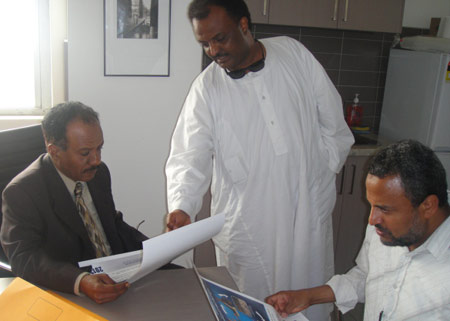 I believe some of us have begun to realize how grave the situation is when Ethiopian officials finally came out to take charge of our resistance, the driver’s seat. The events of the last three years indicate that Ethiopia prefers reformation of the regime regardless of what the resistance want. It seems Ethiopia finds it easier for its national interest to have a reformed PFDJ, its erstwhile, not a different system than what it knew throughout its history with what is now Eritrea. In pursuit of this strategy, Ethiopian officials have been empowering nobodies and weakening the established resistance that has constituency who have been Ethiopia’s honest allies during the last decade or so. To circumvent the constituency problem, Ethiopia has been working very hard to create a force for its selected would-be group of leaders, the one on which it wants to build its stakes and use it as a bargaining chip when finally the inevitable happens in Eritrea.
I believe some of us have begun to realize how grave the situation is when Ethiopian officials finally came out to take charge of our resistance, the driver’s seat. The events of the last three years indicate that Ethiopia prefers reformation of the regime regardless of what the resistance want. It seems Ethiopia finds it easier for its national interest to have a reformed PFDJ, its erstwhile, not a different system than what it knew throughout its history with what is now Eritrea. In pursuit of this strategy, Ethiopian officials have been empowering nobodies and weakening the established resistance that has constituency who have been Ethiopia’s honest allies during the last decade or so. To circumvent the constituency problem, Ethiopia has been working very hard to create a force for its selected would-be group of leaders, the one on which it wants to build its stakes and use it as a bargaining chip when finally the inevitable happens in Eritrea.
This was seen in many ways: undermining the National Conference [ENCDC], empowering a known group within the opposition, polishing a few individuals with the intention of giving the new formations a manufactured semblance of diversity. As if that is not enough, as a key speaker at the Debre Zeit congress that the Ethiopian officials organized, they invited as keynote speaker a man who recognizes neither the Eritrean struggle nor its nationhood, a man who thinks all our struggle was an empty circle, a man who thinks our freedom fighters were a bunch of foolish killers, and they were mainly forcefully recruited “Habesha, who were duped into an Islamist and Arabist cause.” This man was not only the keynote speaker, they gave him the forum for a day and half to spew his hate and prejudice. This is the kind of opposition that some Ethiopian officials want to replace the real resistance with.
There are many incidents that can only reinforce the suspicions of Ethiopian officials’ ill-thought strategy that are not yet brought to the open. But now, they are obviously sabotaging the real struggle with one that is so timid it can’t move an inch without their blessing, and the incident of last September is part of it. This is sad considering the fact that many in the resistance simply treate their alliance with the Ethiopian authorities pragmatically, though old wounds were not yet healed, no closure for the interference of the TPLF in the eighties that is greatly responsible for what we are suffering from now.
The Eritrea of today is a country that is being emptied of its people, especially its youth. In the Eritrea of today all the elements of our pride as a nation are being erased. We have begun to doubt our resolute character, dedication and courage. These were our traits as a people and that is how the world knew us until recently, and that gave us pride and confidence. Now we are known as the most oppressed people whose country is unlivable, poor, insecure citizens of a country with shameful infrastructure… be it in education, healthcare, shelter and road network… and basic human rights. Eritrean institutions are a den of corruption; the security forces are worse than the enemy of decades ago; and we have many sadistic persons who enjoy the suffering of their people. Eritrea has the largest army, but it is so weak due to the corrupt administration of the PFDJ that made it an uncaring, unprincipled force that cannot protect its people. We have an army led by corrupt generals who are all too happy to sacrifice tens of thousands of people on trivial wars, but can’t move a finger when the entire population, including the enlisted members of the armed forces, are enslaved. All this has happened because we betrayed our founding principles. We cowered, we loved ourselves, we feared sacrifice, in all its forms, life, family and property. This is in stark contrast with what we as a people really are; we are a people who fought “against all odds” and sustained the struggle despite the big powers standing behind our enemies, despite being outnumbered and outgunned, we prevailed because we were resolute. Our future can only be bright if we summon the latent quality of an Eritrean that is buried under our feet.
George Orwell said, “He who controls the present, controls the past.” The PFDJ owns our present and therefore owned our past. If we do not snatch our present from it, we will not own our past, and if we do not own our past, we cannot own our future.
The problem we are facing is our history is fading because many people are stuck in the day to day life (the present), “Maybe if people started to listen, history would stop repeating itself.” There is lack of listening, an acute listening defect and that is why we keep repeating history. If people would listen, we wouldn’t be harping on the same issues endlessly and maybe we would have summoned peace to our present and made sure our future would be bright. But educating and reeducating the doubters and the ignorant is our fate which we have to embrace, however painful it is.
I mentioned earlier that Eritrea belongs to all. By ‘all’ I mean the diverse stakeholders of Eritrea. Those diverse entities are not talking to each other; each entity has created a small circle and is engaged in an endless group wailing or group bravado, depending on one’s situation. We have the regimes’ supporters talking to each other and not willing to listen to anyone but to the marching orders of the regime. The opposition that believes in diversity has carried that belief to its extreme end and has become counter-productive, a recipe for war-lordism, an example of which we saw in the person of “general Qernelios.” It is the Ethiopian officials who inflate his ego, they have a pet-name for him, they call him “general Qernelios.” A spoiled man, a warlord in the making. He thinks all our Kunama compatriots are his property and he is the only one entitled to speak on their behalf. That is where we have arrived.
Now, major sections of our nation are sick, both the Muslim and Christian component of our society. The Muslims are marred by tribal mistrust and rivalry, the Christians are marred by regional mistrust and rivalry. Both Christians and Muslims fear each other, and the mistrust is at its highest. Looking at it from a national perspective, one would be tempted to ask: how on earth are we going to bring about the end of the totalitarian regime? But don’t despair, it was done before and it will be done today. We have no other choice but to work together for the betterment of our country, we have to always remember we are destined to live together, to realize our common dreams of a prosperous, stable country where the citizen is respected, and where the government serves the people, not the other way around. We dream of an Eritrea whose young are not enslaved and perpetually forced to think of fleeing outside it boundaries. A country where the people will live a normal life, in peace.
If we are going to remain in our secluded groupings (and I have suggestions for this later on), then it is imperative that we strengthen our institution: what good is a grouping that cannot change anything on the ground? Let’s be formidable, organize with national zeal and fervor… and be effective, but we must not forget to have clarity. Whatever change we seek should be able to accommodate all Eritreans, fairly. We must not be a replica of the PFDJ, where we remain in our comfort zones, divided, yet we claim to be working to bring change for the Eritrean citizen. The change we seek should be embraced by all Eritreans–and we have to identify our enemies properly. Anyone who trashes our history, tampers with it, tries to deny us the pride we take in our martyrs, in the collective suffering of our people and their suffering, is our enemy. We do respect our martyrs, and we are jealous of our country, we will not allow the forces that seek to divide us succeed. Of course they want us to be weak so that we can be easy prey to their evil designs, to reinstate the system of rule that we fought for decades to eradicate. Eritrea has pillars and its people will renovate those pillars. The Eritrea that we as a people paid for dearly is not going to be the playground of the foolish among us… or anyone else: those who never showed judgment or courtesy to our people; those who waited in hiding to maul Eritrea thinking the nation’s resolve is dead.
On this occasion I would like to remind all Eritrean stakeholders that the Muslim grievance is well articulated from the national perspective. It has been articulated in many forms but particularly through the Eritrean Covenant issued by Mejlis Ibrahim Mukhtar, which I believe has achieved an overwhelming support, a consensus. The Christian grievances is not articulated at all. And it will be unfair to consider Isaias’ harangue of Nehnan Elamanan as Christian grievance. It will also be an insult to Christians to characterize their real grievances and fears based on the writings of some revisionist writers who deny the existence of Eritrea and have nostalgic memories of unity with Ethiopia under Abyssinian leadership, a Habesha lordship. It would be unfair to consider those chauvinist bigoted voices as representing the views of Eritrean Christian patriots. Those are fringe ideas; and Muslims also have individuals with similar fringe ideas.
Patriotic Christians love their country just like anyone else. They have sacrificed for their country just like anyone else. They agonize for the situation of Eritrea just like anyone else. And they are bearing the brunt of the refugees situation at this time. Any Eritrean who cares for his country and the unity of its people should recognize these facts. By now, we have all paid equal sacrifices and all patriotic Eritreans, regardless of their layers of identities, have a common goal, a common aspiration and a common fate that begins with uprooting the oppressive totalitarian regime in Eritrea.
Here I would like to make a few recommendations:
1. Our 2013 resolution should include: Get to know 4 Eritreans this year who are not from your tribe, ethnicity, region, or religion but are in the Eritrean resistance movement. Preferably in person, and if you can’t, have conversations with them through social media, by phone, by skype, Paltalk, by whatever. I am talking about one-on-one personal conversations where you LEARN what their grievances are. Call It Campaign 4. Then ask each one you talked to, to reach out to 4 more and so on and so on.
2. Related to that, make an effort to reach out to 4 Eritreans who have completely accepted their adopted identity (hyphenated citizenship) and forgot all about Eritrea. You know them: they can tell you everything about their adopted homes—football teams, and the names of princes and princess and entertainers, American pop culture—but are entirely clueless about what is happening in Eritrea. Then ask each one to reach out to 4 more. I am coming back next year to Australia and I will like to see what you have done on this!
3. Force the resistance organizations to have a united symbol that will reinforce a common goal, a common destiny.
4. Show your support (with your time and your money) to the resistance forces so they don’t become dependent on others and prone to blackmail. Their weakness is our weakness.
5. Force Eritrean resistance forces to develop a criteria to determine who is an organization and who is not. The recent crisis has shown us how irrelevant three-person groups can cause havoc. Political leadership is for organized political forces, not for part-timers who have no constituency but act on their personal whims.
6. Push hard to realize the unification of the forces of resistance, particulary their armed wings. Do not encourage their tendency to split, force them to explain why they are separate entities.
7. Those of you who can, should work to impose a new reality on the situation of Eastern Sudan. A region which is a historical backyard of Eritreans should not be controlled by Isaias.
8. Convince and encourage the “Youth” to be more assertive and stop wailing after any calamity or bad news from home or about home. Convince them to take action to rectify things so that they can be taken seriously. There are things that can be done beyond petitions and demonstrations, the previous generation of fighters didn’t spend their time begging for sympathy, they imposed their will, they influenced events.
Finally, we have to get out of our primordial prejudices and face those who are trying to undo what we paid for dearly. We have to stay steadfast with the promise of our martyrs, yes, Hdri Sewuatna, resalet alsuhada’a, and defeat the forces that are created only to be defeated: the oppressors.
NB: Speech and images of final event held on Feb2, 2013 will follow.
Youtube links of the events, courtesy of awna1.com:

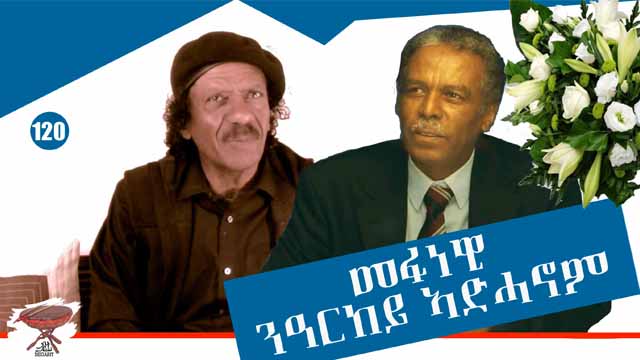
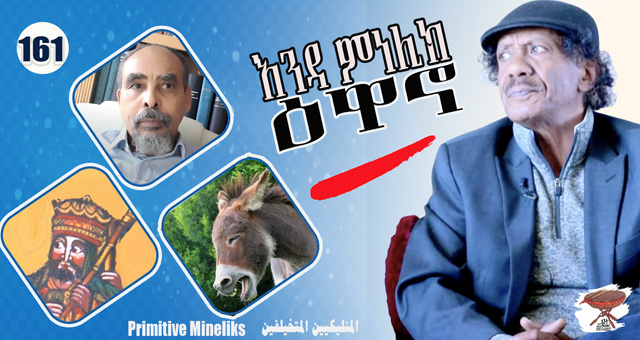
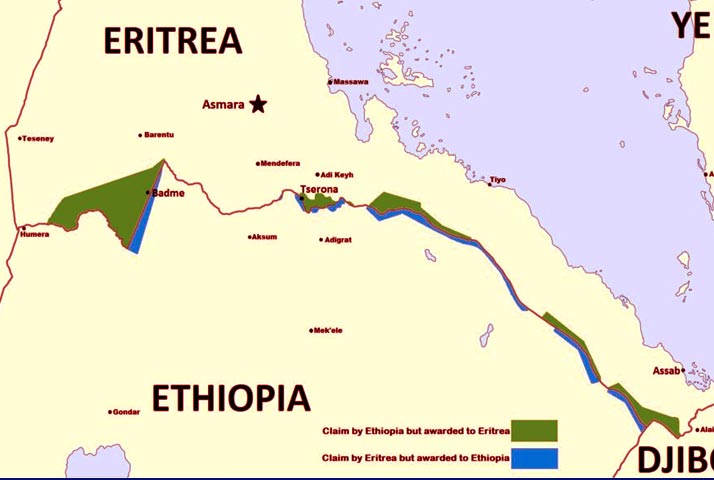
Awate Forum